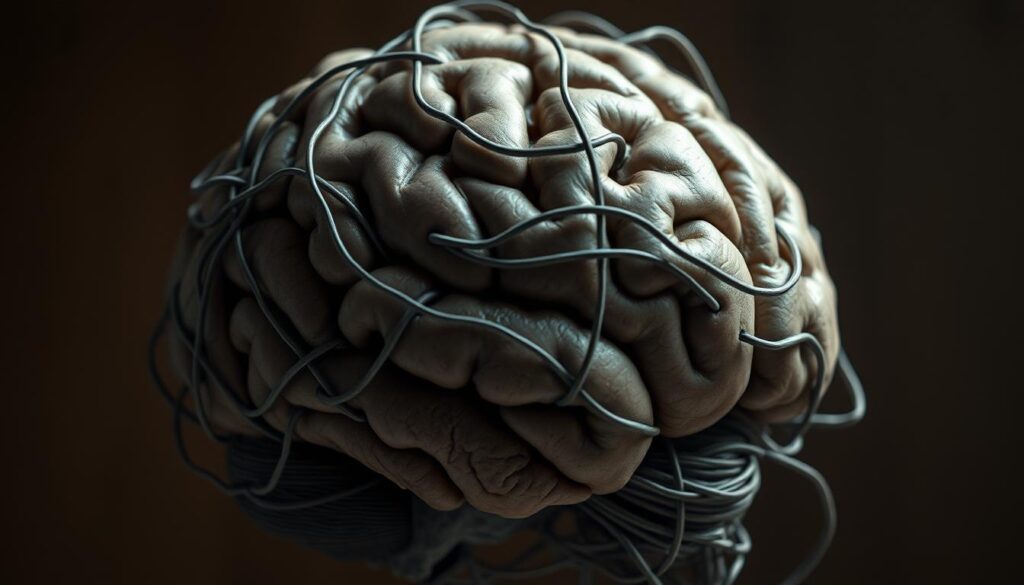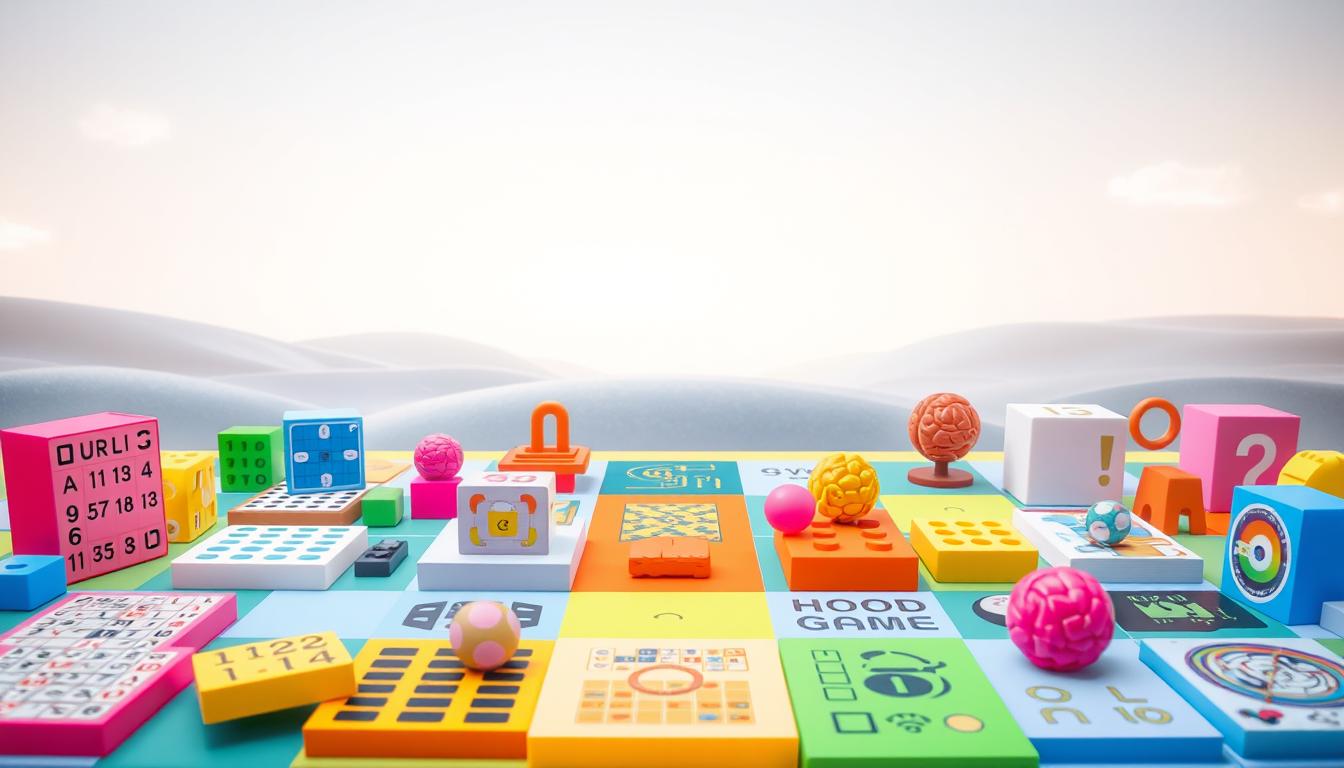Mental games that train cognitive endurance in repetitive tasks
Ever wondered why some people ace repetitive tasks while others find it hard to stay focused? Cognitive endurance is key to handling daily tasks and complex projects. Playing mental games can boost your skills in tackling boring tasks.
In a world full of distractions, these games sharpen your problem-solving and memory. They help improve your concentration, leading to better brain health. Let’s see how these exercises can change how we handle repetitive tasks.
The Importance of Cognitive Endurance
Cognitive endurance is key to keeping our minds sharp every day. It helps us tackle tasks and challenges with ease. Understanding our brain health is crucial for better mental well-being.
A resilient mind boosts our problem-solving skills, memory, and focus. By doing mental exercises and living healthy, we keep our brains in top shape. This helps us avoid losing mental sharpness as we age.
Understanding Cognitive Health
Cognitive health is about how our brains work. It affects our thinking, learning, and memory. Diet, exercise, sleep, and mental challenges all play a big role in brain health.
By focusing on these areas, we build a strong mental foundation. This lets us handle daily tasks and complex challenges with ease.
Benefits of Enhanced Cognitive Endurance
Having a strong cognitive endurance brings many benefits. It’s not just about staying focused. Here are some key advantages:
- Improved memory recall, making it easier to remember things.
- Heightened focus, helping us stay attentive even when tasks are boring.
- Reduced risk of age-related cognitive decline, keeping our minds sharp as we get older.
Regular brain training builds a strong mental structure. It helps us handle less exciting tasks while keeping our minds healthy.

How Repetitive Tasks Affect the Brain
Repetitive tasks can really wear down our brains. They lead to mental fatigue and strain our thinking abilities. Daily tasks that are the same can take a toll on our minds.
The Science Behind Mental Fatigue
Mental fatigue happens when we use too much of our brain power. Doing the same thing over and over can make our brains less sharp. It’s harder to focus and think clearly.
Impact on Productivity and Wellbeing
Mental fatigue isn’t just about feeling tired. It can also make us less productive and more stressed. When our brains are tired, even simple tasks seem hard. This can make us unhappy at work and affect our mood.

Brain Games for Low-Interest Task Persistence
Doing low-interest tasks can make us lose focus and motivation. Brain games help keep us engaged in these tasks. They are fun and also improve our brain skills for staying focused.
Definition and Examples of Brain Games
Brain games are activities that make our brain work harder. They help us stay focused by keeping our minds busy. Some popular ones are:
- Crossword puzzles
- Memory challenges
- Sudoku
- Word search games
- Logic puzzles
These games make our brain work better. They help us solve problems and remember things better. This makes our brain stronger.
Mechanisms that Enhance Task Persistence
Brain games make our brain get used to new things. This makes it easier to stay focused on boring tasks. The brain works better because of:
- Memory Enhancement: Playing brain games improves our memory.
- Cognitive Flexibility: Trying new things makes our brain more flexible.
- Problem-Solving Skills: Solving puzzles in games makes us think better.
In short, brain games help us stay focused on tasks that are not so exciting. They make our brain work better.
The Benefits of Brain Training
Brain training boosts your mental sharpness in many ways. It helps improve memory recall and concentration. These activities challenge your brain, making it better at handling repetitive tasks.
Memory Recall and Concentration
Brain training strengthens your memory and focus. Games and activities that sharpen attention help your brain. This way, you can hold onto information better, even when tasks are dull.
Improvement in Processing Speed
Brain training makes you faster at handling tasks. It lets you multitask smoothly and boosts your performance at work and home.
Lower Risks of Cognitive Decline
Brain training fights off cognitive decline. It keeps your mind sharp as you age. This helps you stay mentally agile for years to come.
Types of Mental Games for Cognitive Endurance
Playing different mental games can really boost your brain power. These games work on different parts of the brain. They help keep your mind sharp and focused.
Puzzles and Crossword Challenges
Puzzles and crosswords are fun and brain-stimulating. They make you think critically and solve problems. This helps improve your memory and thinking skills.
Memory and Word Games
Memory and word games challenge your brain in fun ways. They help you remember things better and learn new words. Regular play makes your brain stronger and your language skills better.
Attention and Focus Activities
Games that test your attention and focus help you concentrate better. They train your brain to stay focused on tasks. This makes you sharper and more productive over time.
| Type of Game | Benefits | Examples |
|---|---|---|
| Puzzles | Improves problem-solving and critical thinking | Jigsaw puzzles, Sudoku |
| Crosswords | Enhances vocabulary and memory | Newspaper crosswords, online crossword apps |
| Memory Games | Boosts recall and cognitive performance | Memory card matching, mnemonic devices |
| Word Games | Strengthens language skills and cognitive flexibility | Scrabble, Boggle |
| Attention Games | Improves focus and mental agility | Simon Says, concentration games |
| Focus Activities | Enhances sustained attention and task persistence | Meditation, timed focus challenges |
Brain Endurance Training Techniques
Brain Endurance Training (BET) is a method to boost your brain’s stamina. It uses specific techniques to challenge your brain step by step. By using BET, you can get better at handling tough mental tasks.
Introduction to Brain Endurance Training (BET)
BET makes you tackle harder brain exercises gradually. This method builds your mental strength and helps you deal with tiredness. It teaches you to stay focused and productive, even when tasks get tough.
Progressive Exposure and Mental Conditioning
Progressive exposure is key in BET. It involves facing different brain challenges that get harder over time. This helps you become more resilient and better at repetitive tasks, making your brain stronger.
As you do these exercises, you get better at handling the challenges. This makes mental conditioning a natural part of your life. It helps improve your focus, memory, and overall brain health.
| Cognitive Technique | Description | Benefits |
|---|---|---|
| Progressive Exposure | Gradual increase in task complexity | Builds mental resistance |
| BET Methodology | Structured approach to training | Enhances cognitive stamina |
| Mental Conditioning | Training the mind to adapt to stress | Improves focus and performance |
Popular Brain Training Apps
Many brain training apps have popped up to boost mental skills. Lumosity, CogniFit, and Brain Jones are among the top choices. They use fun games and tasks to improve cognitive functions.
Overview of Leading Apps
Each app has special features for different needs:
| App Name | Key Features | Target Areas | Price Range |
|---|---|---|---|
| Lumosity | Personalized training, progress tracking, diverse games | Memory, attention, problem-solving | $15/month or $80/year |
| CogniFit | Customized learning paths, real-time feedback, multiplayer options | Cognitive skills, emotional intelligence | $19/month or $99/year |
| Brain Jones | Brain mapping feature, training recommendations, goal tracking | Speed, memory, concentration | $12/month or $60/year |
Choosing the Right App for Your Needs
Choosing the right app means knowing what you want to improve. Look for apps that let you set your own goals and adjust the difficulty. It’s important to find an app that fits your needs and goals.
Research Supporting Brain Training Effectiveness
Recent studies show brain training really works. They found that doing brain exercises regularly can make our minds better. People get better at remembering things and thinking faster.
Study Insights on Cognitive Enhancement
Brain training studies show big changes. People who do special brain exercises get much better than those who don’t. The research shows that brain training is more effective than old ways of learning.
Comparison with Traditional Methods
Brain training is way better than old methods. It uses new, smart tasks that make our brains stronger. This means people who do brain training get better at thinking and remembering things.
Personalizing Your Brain Training
Personalized brain training changes how we improve our minds. It finds out what each person needs and likes. This makes learning more effective and fun.
It lets users do activities that help them the most. This way, they see big improvements in their thinking skills.
The Power of Tailored Approaches
Using tailored methods means creating plans that fit each person’s brain. It makes learning more interesting and helps remember things better. This way, training is more effective and meets each person’s goals.
Tools that track progress help make changes. This lets users focus on areas they need to work on. It helps them get better at thinking in many ways.
Setting clear goals is key to staying motivated in brain training. Goals give direction and help track progress. They make it easier to see how far you’ve come.
By setting specific goals, you can celebrate your successes. Regular checks help make sure your training is working. This keeps your mind improving all the time.
Integrating Brain Games into Daily Life
Adding brain games to your daily routine is key to improving your brain’s strength. Try to fit in puzzles or memory games whenever you can. This could be during your commute, while waiting, or during breaks.
Sticking to a routine helps your brain grow stronger. It makes these activities a part of your daily life.
Making Time for Mental Exercises
Setting aside time for brain games helps you get into the habit. It’s good to do a few minutes in the morning or evening. This boosts your brain’s power.
Smartphone apps make it easy to fit in these exercises. They’re fun and don’t take up too much time.
Combining Physical and Mental Training
Improving your brain health means combining physical and mental workouts. Activities like walking or aerobics are great. They make you fit and also help your brain.
This mix of exercise and brain games strengthens your brain. It helps your brain adapt and stay healthy.
Challenges in Maintaining Cognitive Endurance
Maintaining cognitive endurance can be tough, often leading to mental exhaustion. It’s key to recognize when you’re feeling fatigued. Signs like decreased concentration, irritability, and tiredness mean it’s time to take action to keep your mind sharp.
Recognizing Mental Exhaustion
Knowing the signs of mental exhaustion is crucial for those aiming to boost their cognitive endurance. Look out for:
- Diminished focus on repetitive tasks
- Increased irritability and frustration
- General feelings of fatigue
- Decreased motivation to engage in activities
Spotting these signs early can help lessen their impact and manage cognitive challenges better.
Strategies to Overcome Barriers
Using strategies to fight mental fatigue can be very helpful. Some effective ways include:
- Taking regular breaks to recharge
- Practicing mindfulness to maintain mental clarity
- Utilizing effective time management techniques
- Engaging in physical activity to enhance overall well-being
These methods not only help overcome barriers but also build resilience. They help keep performance levels up, even when tasks seem hard. Using these strategies regularly can greatly improve focus and engagement in daily tasks.
Future Trends in Cognitive Training
The world of cognitive training is changing fast. New technology is making it easier to improve our minds. We’re seeing more AI in brain training and tools that help us stay mentally sharp.
Emerging Technologies in Brain Training
New tech like virtual reality and mobile apps is changing brain training. These tools offer fun, interactive ways to learn. They make it easier and more fun to improve your mind.
The Role of AI in Cognitive Wellness
AI is making brain training smarter by tailoring programs to each person. This makes training more fun and effective. It keeps users motivated and helps them get better all the time.
| Technology | Description | Benefits |
|---|---|---|
| Virtual Reality | Immersive environments for cognitive exercises | Increased user engagement and realism |
| Mobile Applications | Access to various brain training games | Convenience and personalized workout plans |
| Wearable Devices | Track cognitive performance in real-time | Data-driven insights for improvement |
Conclusion
Building cognitive endurance through mental games is key to mastering repetitive tasks. It also keeps our brains healthy. By playing different brain games, we can improve our focus and reduce the risk of cognitive decline.
Adding these activities to our daily lives helps us use technology wisely. It boosts our mental agility and prepares us for future challenges. This way, we not only improve our endurance but also strengthen our brain’s resilience.
Understanding the value of brain health is vital. Developing cognitive endurance is a long-term effort. With the right tools and dedication to mental training, anyone can enhance their cognitive abilities and perform better every day.
FAQ
What are mental games and how do they impact cognitive endurance?
Mental games are activities that challenge your brain. They help keep your brain sharp and healthy. This is key for handling boring tasks.
They boost your focus, memory, and problem-solving skills. This makes you more mentally tough.
Why is cognitive health important?
Cognitive health is vital for your brain’s top functions. It affects your mood and overall life quality. A healthy brain helps you solve problems better, remember things, and stay focused.
This helps prevent your brain from getting worse over time.
How do repetitive tasks affect cognitive performance?
Doing the same thing over and over can make your brain tired. You might find it harder to pay attention and get things done. This is because your brain gets worn out from doing the same thing too much.
What signs indicate mental fatigue?
Feeling mentally tired can show in many ways. You might find it hard to focus, get annoyed easily, or just feel really tired. Spotting these signs is important to keep your brain sharp.
Can brain games help with productivity during low-interest tasks?
Yes, brain games like puzzles and memory games can help. They make your brain stronger and more focused. This makes it easier to stay productive when you’re doing something boring.
What are the benefits of engaging in brain training exercises?
Brain training can improve your memory, concentration, and how fast you process information. It also lowers the chance of your brain getting worse with age. It makes you better at doing brain tasks.
How can someone integrate brain games into their daily life?
You can play brain games during your commute or breaks. This helps make it a habit. It also makes your brain work better when you do it every day.
What is Brain Endurance Training (BET)?
Brain Endurance Training (BET) is a way to make your brain stronger. It uses exercises that get harder as you get better. These exercises are like real-life challenges that help your brain fight off tiredness.
Which apps are recommended for brain training?
Apps like Lumosity, CogniFit, and Brain Jones are great for brain training. They offer training plans that fit your needs. These plans use fun tasks to challenge your brain.
How can brain training exercises prevent cognitive decline?
Doing brain training regularly can slow down brain aging. It can make your brain work like it’s seven years younger. This helps you keep your brain sharp as you get older.
What role do emerging technologies play in cognitive training?
New technologies like AI and virtual reality are changing brain training. They make training more fun and tailored to you. This makes brain training more effective.
How can setting cognitive goals improve brain training outcomes?
Having clear goals for your brain training is key. It helps you see how far you’ve come and keeps you motivated. Setting goals that you can reach helps you track your progress and adjust your training as needed.














